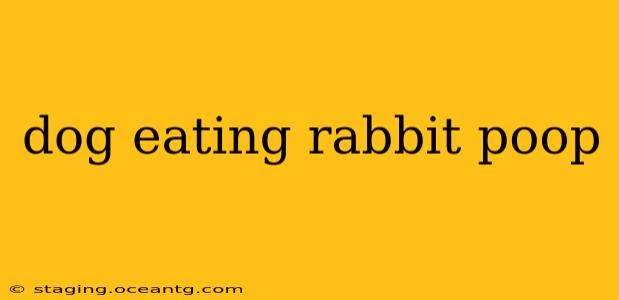Many dog owners find themselves perplexed and frankly disgusted when they discover their canine companion indulging in a rather unappetizing snack: rabbit poop. This behavior, known as coprophagia, isn't uncommon, and while it might seem bizarre, understanding the underlying reasons can help you address the issue. This comprehensive guide explores why dogs eat rabbit droppings and what you can do about it.
What Causes Dogs to Eat Rabbit Poop?
Several factors can contribute to a dog's fascination with rabbit scat. It's not always a simple answer, and often a combination of reasons is at play. Let's delve into the most common causes:
Nutritional Deficiencies:
One primary reason dogs may eat feces, including rabbit droppings, is a nutritional deficiency. A lack of essential nutrients in their diet can lead them to seek out these sources for supplemental sustenance. This is particularly true if their regular food lacks vital vitamins and minerals. Make sure your dog's diet is balanced and high-quality. Consult your veterinarian for recommendations on appropriate food choices for your breed and age.
Pancreatitis:
Pancreatitis, an inflammation of the pancreas, can also cause coprophagia. This condition affects nutrient absorption, potentially leading your dog to seek alternative sources of nutrients in feces. If you suspect your dog has pancreatitis, immediate veterinary attention is crucial.
Parasites:
Internal parasites like worms can rob your dog of vital nutrients, leading them to seek out additional sustenance from unusual sources like rabbit droppings. Regular deworming is essential to prevent and treat parasitic infections. Consult your vet regarding a suitable deworming schedule for your dog.
Behavioral Issues:
Sometimes, coprophagia is a learned behavior. Puppies might learn this habit from their mothers or littermates. In other cases, it can be a sign of boredom, stress, or anxiety. Providing sufficient exercise, mental stimulation, and a safe, enriching environment is critical to addressing behavioral causes of coprophagia.
Is Rabbit Poop Dangerous for Dogs?
While rabbit feces aren't inherently toxic, they can still pose some health risks. Rabbit droppings can harbor parasites and bacteria that could infect your dog. Furthermore, the rabbit's diet can influence the contents of its feces. If the rabbit consumes plants toxic to dogs, those toxins could be present in the droppings. Therefore, even if seemingly harmless, it's crucial to prevent your dog from consuming rabbit poop.
How Can I Stop My Dog From Eating Rabbit Poop?
Preventing coprophagia requires a multi-pronged approach:
Improve Diet:
Ensure your dog's diet is balanced and provides all the necessary nutrients. A high-quality commercial dog food or a vet-approved homemade diet can make a significant difference.
Address Underlying Medical Conditions:
Consult your vet to rule out any medical conditions contributing to coprophagia. Regular check-ups and prompt treatment of any identified issues are vital.
Manage Parasites:
Regular deworming is crucial to prevent and treat parasitic infections that might be contributing to the behavior.
Environmental Management:
Clean up after rabbits promptly. If possible, fence off areas where your dog has access to rabbit droppings.
Positive Reinforcement Training:
Train your dog with positive reinforcement techniques. Reward your dog for ignoring rabbit droppings with treats or praise. This can take time and patience.
What If My Dog Already Ate Rabbit Poop?
If your dog has already consumed rabbit droppings, monitor them closely for any signs of illness, such as vomiting, diarrhea, lethargy, or changes in appetite. Contact your vet immediately if you notice any concerning symptoms. They can assess your dog's health and provide appropriate advice.
This information is for general knowledge and should not be considered a substitute for professional veterinary advice. If you are concerned about your dog's behavior, consult with your veterinarian for a proper diagnosis and personalized treatment plan.
